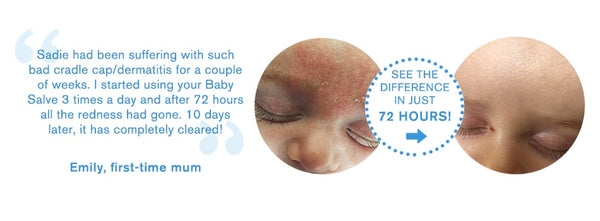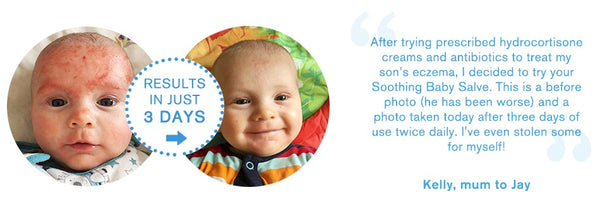Living with eczema can be challenging – whether you’re caring for a child with sensitive skin or experiencing symptoms yourself.
This common skin condition affects people of all ages, but it’s especially widespread in children, and its triggers can vary from household products to stress, diet, and even changes in the weather.
The good news? With the right approach, it’s possible to calm irritation, strengthen the skin barrier and make everyday life more comfortable.
In this guide, we’ll explore what eczema is, the common causes of flare-ups, and the ingredients to avoid. We’ll also share practical skin care tips, dietary considerations, and our favourite natural, eczema-friendly skin care products to help you care for sensitive skin – every day and during flare-ups.
Summary:
- Eczema can affect anyone at any age, but is more common in babies and young children
- Skin-irritants in household and personal care products, pets, wool, heat, stress, food intolerances and dust mites can all contribute to eczema flare-ups
- Avoiding ingredients like SLS, fragrance, drying alcohols and petroleum-based ingredients can help with eczema symptoms
- It is essential to moisturise regularly and follow an eczema skin care routine that takes care of your skin barrier
- Our recommended eczema-friendly moisturiser for everyday: Green People Scent Free 24-Hour Cream
- Our recommended product for times of discomfort: Green People One Balm
- Our eczema-friendly salve for babies: Organic Babies Soothing Baby Salve
What is eczema (dermatitis)?
Eczema comes from Greek and means ‘to boil over’. It’s also known as chronic dermatitis.
Eczema is a condition that affects people of all ages, but is especially prevalent in babies and young children. Whilst the visible symptoms of eczema show on the skin, it’s generally accepted that it is closely linked to the internal health of the body.
Whilst creams and salves may offer some relief, they are not the complete answer to managing this condition. Often there needs to be some holistic changes to your lifestyle and/or diet, as well as your eczema skin care routine.
Atopic eczema (dermatitis)
Atopic eczema, the most common form of eczema, affects 1 in every 5 children [1], and often runs in families.
It’s estimated that almost 80% of atopic eczema cases start before the age of 5 and one third of babies and children with atopic eczema will develop asthma and/or hay fever.
Symptoms of atopic eczema include dry, itchy, red and inflamed skin. Areas of the skin may be cracked and scratching can cause open wounds that are prone to infection.
If eczema becomes inflamed the skin may develop blisters and weep - a condition known as 'wet' eczema.
An abnormality in the gene associated with a healthy skin barrier as well as abnormalities in the normal inflammatory and allergy responses has been closely linked to the development of eczema. [2]
This can make the skin barrier more vulnerable, and harsh ingredients can further irritate and penetrate the skin.
There are several things that can cause atopic eczema to flare-up. These include:
- Skin-irritants in household and personal care products
- Pets
- Wool
- Heat
- Stress
- Food intolerances
Dust mites, which thrive in warm, moist environments such as bedding, mattresses, curtains and carpets.
To prevent dust mites, air bedding well, avoid carpets in the bedroom, use a powerful vacuum cleaner and dust with damp micro-fibre cloths.
Soothing, eczema-friendly skin care from Green People
Green People was founded in 1997 by Charlotte Vøhtz, a mum looking to soothe her daughter’s eczema symptoms. Many years on, we offer a wide range of gentle, eczema-friendly products.
We formulate soothing, natural skin care products that are suitable for skin that may be prone to eczema and skin allergies.
Made with pure, organic plant extracts and no harsh, drying or irritating ingredients, Green People products support the skin barrier and are much gentler on sensitive skin than ordinary high street brands.
Eczema-friendly skin care routine
If you experience eczema on your face or neck, we recommend choosing facial skin care from our scent-free collection.
Our best-selling Scent Free 24-Hour Cream is our best eczema-friendly moisturiser. Completely unscented, it is ideal for sensitive, reaction-prone skin. It contains Olive Squalane, which is an ultra-gentle, anti-inflammatory, natural emollient packed with natural, skin-balancing benefits.
This makes it perfectly placed to calm redness and irritation and the ideal ingredient for eczema or psoriasis-prone skin.
- Conditions, moisturises and reduces water loss
- Restores suppleness and elasticity
- Reduces the appearance of wrinkles
- Softens and soothes dry skin

Scent Free 24-Hour Cream 50ml
Healthy skin starts with our bestselling moisturiser for sensitive skinComplete your eczema-friendly facial skin care routine with more products from our fragrance-free selection:
Browse more scent-free skin care.
Eczema-friendly body care routine
If you experience flare-ups of eczema on your body, it is important that everything you put on your hair and body is kind to your skin.
That’s why we have developed a range of ultra-gentle hair and body care products. Made without fragrance or harsh ingredients such as SLS and ethyl alcohol, these eczema-friendly body care products cleanse and calm, whilst respecting your skin barrier.
For the shower:
For post-shower body care:
Caring for flare-ups
When your skin is feeling uncomfortable, you may like to carry a little pot of One Balm with you.
This waterless, certified organic skin balm knows just what to do to shield your skin from dryness, irritation and the elements. Packed with protective plant oils and rich, reparative actives this is the skin barrier boost to reach for whenever your skin needs rescue.

ONE Balm 30ml
Use this organic multi-purpose beauty balm to soothe lips, cuticles and dry skin€20,95
Eczema-friendly salve for babies
If you are caring for a baby or child with eczema, or your skin is prone to flare-ups, we recommend our Soothing Baby Salve.
Made with emollient Hemp to relieve discomfort, along with vitamin-rich Shea Butter and soothing Calendula to moisturise and calm, this intensive salve can be used on both face and body. This natural ‘solve all’ really isn’t just for babies!

Organic Babies Soothing Baby Salve 100ml
Protect, soothe, and calm with our best-selling organic baby salve€22,95
Real-life results with our Soothing Baby Salve
Skin care ingredients to avoid with eczema
When it comes to choosing skin care, it’s best to keep your skin care routine for eczema simple and gentle. Stick to products that use natural ingredients and are made for sensitive skin. At Green People, we avoid all of the below ingredients.
Ingredients to avoid if you have eczema-prone skin:
- sodium lauryl sulphate (SLS)
- artificial fragrances and perfumes
- drying alcohols like ethanol
- harsh ingredients like benzyl peroxide
- petroleum-based ingredients like mineral oil, petrolatum and paraffin wax
- harsh preservatives
When it comes to exfoliants, avoid chemical ones like glycolic acid, lactic acid and salicylic acid in high concentrations, as well as physical scrubs with really rough beads or particles. These can damage the skin barrier and irritate eczema-prone skin.
Eczema skin care tips
Building an eczema skin care routine is important to keep your skin feeling calm and comfortable. As well as using eczema-friendly skin care products, there are some simple skin care tips for eczema that you can follow too:
- Avoid harsh skin care, soaps, shower gels, shampoos, sunscreens and bath products
- Use products fortified with Jojoba Esters, essential fatty acids and plant-based emollients such as Squalane to help restore moisture and sebum balance. Moisturise your skin several times a day and use moisturising lotions or salves to cleanse affected areas
- Avoid products containing harsh preservatives and synthetic fragrances. Even essential oils can be a problem for some with eczema
- To reduce the itching, choose cotton clothing and bedding to keep the skin cool and allow it to breathe. Avoid synthetic fabrics and wool, which can irritate.
- Use a gentle washing powder and avoid fabric softeners
- At night, cotton mittens or gloves help reduce the damage caused by scratching whilst asleep
- Stress can make eczema worse, so try to manage stress and practice relaxation techniques
How often should I moisturise with eczema?
If you have eczema, keeping your skin moisturised is really important. Most people find that twice a day works well, but you might need to top it up more often if your skin feels tight, dry or itchy.
It’s always a good idea to moisturise straight after a bath or shower, or even after washing your hands, to help lock in as much moisture as possible. Making it part of your regular routine can help.
Some moisturisers last longer than others too. Thicker creams and ointments usually give more protection than lotions, so you may not need to put them on quite as often.
If your skin is flaring up, the weather is cold or your skin feels especially sore, moisturising more often can be a good idea.
Dietary advice for eczema sufferers
Many cases of eczema seem to be linked to food intolerances, and may flare up after eating certain classes of foods. [3]
This is especially true in the case of baby eczema, which can be linked to intolerance to dairy foods.
For those with a dairy intolerance, by avoiding cow’s milk, and foods made from milk such as butter, cream and cheese, symptoms of eczema can improve. [4] It’s important that you speak to a doctor before cutting out food groups - it can help to keep a food diary.
Citrus fruits and tomatoes can also be an eczema trigger, so this may be something to look into if you’re experiencing flare ups. Intolerances to other classes of food are possible, and where these are suspected, expert advice should be sought to determine whether these exist.
Please note:
Eczema is a medical condition. If you concerned about your skin or your child’s skin, please consult a medical professional. Seek medical advice before making any changes to your diet.
We hope you have found this guide useful. Our UK customer care team is happy to help you identify which of our natural eczema-friendly skin care products might be suitable for your skin. Please call us on 01403 740350 or talk to us on social @GreenPeopleUK.
If you wish to republish this content, please credit Green People as the original creator with a link to 'Essential guide to eczema skin care.' Please do not use an affiliate link.
REVIEWED BY CHARLOTTE, FOUNDER OF GREEN PEOPLE
This blog post has been reviewed by Charlotte Vøhtz, founder of Green People, who has 25+ years of experience in the natural and organic beauty industry.
A recognised leader in the field of organic beauty, Charlotte helped inform the UK's first organic beauty standards and was voted the People’s Choice in the 2023 list of Who’s Who in Natural Beauty.
A published author, she wrote the organic beauty bible ‘Naturally Gorgeous’. Previously, she qualified as a nurse and spent over 10 years working in pharmaceuticals.

[1]https://eczema.org/information-and-advice/
[2]https://pmc.ncbi.nlm.nih.gov/articles/PMC3122139/
[3[https://eczema.org/information-and-advice/triggers-for-eczema/allergy-and-eczema/




























